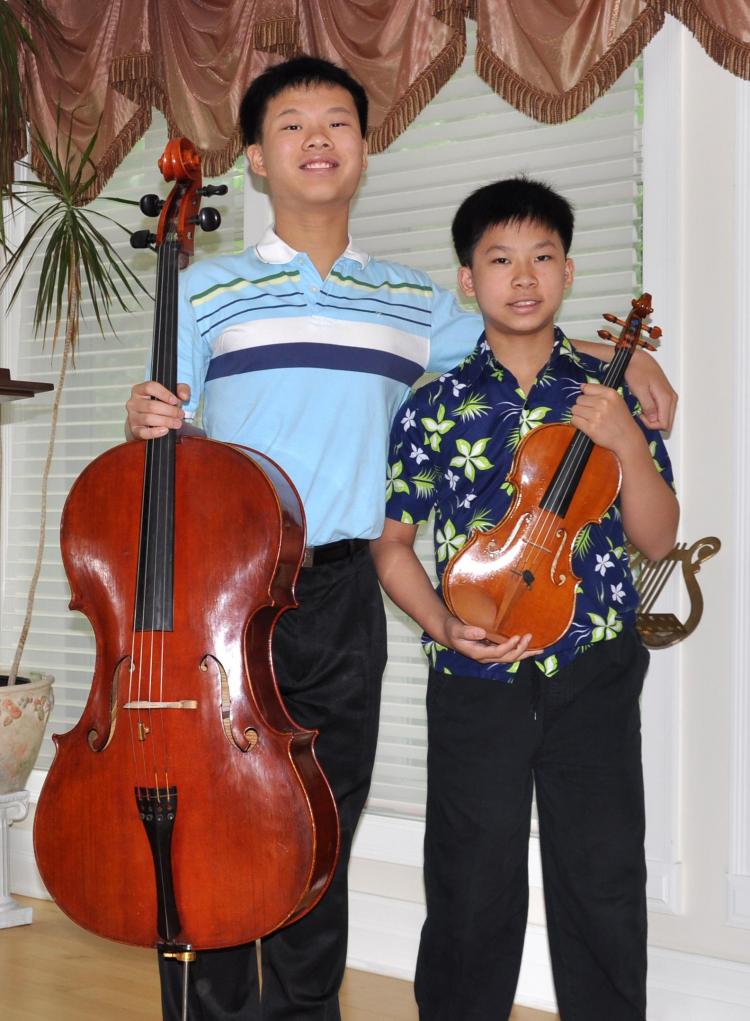OTTAWA—If it’s young people who will shape the world of the future, we are in good hands with Stanley and Kerson Leong. The brothers, 15 and 13 respectively, are classical musicians attending Ashbury College in Ottawa.
Theirs is a close family that supports each other, and the brothers frequently credit their parents with introducing them to classical music and encouraging them to learn to play musical instruments. From their father, Kin-Wai, an MIT alumnus and physicist, Stanley says he learned about the qualities of acoustic resonance and other scientific principles that he can apply to music, sports, and his studies.
Their mother, Tu Mach, runs a music school and introduced the boys to classical music by teaching them to play the piano when they were very young. However, it wasn’t long before the brothers each found an instrument they loved.
Stanley was just five when he chose the cello. “I gravitated toward the sound of the cello, innately I liked it,” in part, he says, because his mother often listened to cello music when she was pregnant with him.
When Kerson was two, he was attracted by the sounds produced by the violin. “I just found it fun to play around with and then just naturally started to learn how to play it,” he says. By the time he was four, he was receiving formal violin lessons.
One of the brothers’ skills is the ability to play complex musical pieces very quickly without missing a note, which comes from a combination of hard work and practice.
“It comes after years of hard work,” Stanley says. “You reinforce your muscle memory, build on it, and it becomes natural after a while.” Kerson on the other hand says, “I think it comes naturally to me.”
“Music is really special in that you don’t just get joy out of moving the fingers and moving the body. When you play and listen to music you get feelings out it. The sound of music enriches our brain,” says Stanley.
“We develop a bond with the audience just by playing music. Music is like telling a story to the audience.”
Both boys practice 1.5 – 2 hours on weekdays and 3-6 hours on weekends. Their school has a full curriculum of academics, sports, and arts as well as a heavy homework load that limits the time they have for practicing on school nights.
The brothers, who are humble about their musical skill levels, are not only accomplished musicians but enjoy sports and are gifted academically as well. Both like to play the Wii in their spare time and participate recreationally in a wide range of sports offered at their school. Kerson focuses on swimming because he finds it relaxing. Stanley trains intensively in badminton and swimming outside of school.
Both are participants in the NAC (National Arts Centre) Orchestra’s Young Artist Program, where they met Pinchas Zukerman who invited them to play at the 2008 NAC Gala fundraiser. They agree that being able to play at such an event gave them the chance to pay back the supporters that sponsor the program.
Both have tried traditional Chinese musical instruments and find that while the techniques are similar, the sound characteristics are very different.
The brothers have dabbled in jazz, Stanley on the trumpet and piano and Kerson on clarinet, although their current schedules don’t allow much time for it. Stanley likes to play jazz “because you can make up your own musical ideas and improvise from there.”
He finds jazz relaxing, he adds. “It stimulates the brain in a different way than classical music does.” Kerson says he listens to pop music and occasionally heavy metal “just to get my brain moving again.”
Kerson likes to research the 18th century Italian master violin makers like Stradivari and Guarneri. He says he would love to own a “del Gesu” (the name given to Guiseppe Guarneri instruments because they are inscribed with a religious symbol).
“It would be a dream for me to play or even own a del Gesu or even a Strad one day.”
Since winning the Menuhin competition in the junior category in Oslo, Norway earlier this year, Kerson has performed with the Oslo Philharmonic Orchestra and has been invited to many European countries to play.
“It was a great joy,” he says of the competition. “I think it was the greatest experience of my life.” Through the competition he met other young people who are very talented and for whom classical music is a large part of their lives, so they quickly made friends.
Last playdates before a much-deserved family vacation are July 21 in Montreal with I Musici de Montreal Chamber Orchestra, and July 23 at the Ottawa Chamber Music Society fundraiser.
The 2010 Ottawa Chamberfest officially begins on July 24 but is preceded by a fundraiser at the Canadian Museum of Nature on July 23. The evening features Frederica von Stade in conversation with renowned broadcaster Eric Friesen as she discusses her 30-year career of singing in theatres around the world. The event is part of the mezzo-soprano’s international farewell tour. Kerson will play a recital at the event.
To get tickets for the Ottawa Chamber Music Society fundraiser or any of the Chamberfest events call the box office at 613-234-6306. The complete 2010 Festival schedule and performer information can be seen at chamberfest.com.







